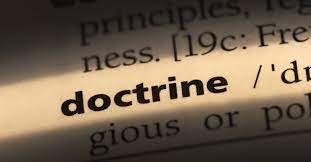By: Michelle Johnson | June 20, 2021
What comes to mind when you hear the word “doctrine”? This was the opening question at a leadership training I attended a handful of months ago. Here were just some of the responses: boring, stuffy, truth, old-fashioned, law, and catechism or confirmation class. It was interesting to ponder the variety of answers. I was challenged to consider what I thought about doctrine and the role it played in my life as a follower of Jesus. When you are unsure about a topic, lost as to what the right answer or response is to a situation where do you turn? Is it to a query of your closest “friends” on Facebook or a quick search on Google? The world tells us it has answers (lots of answers) to all of life’s big questions. However, in the post-modern or post-post-modern world we find ourselves, the answers the world has to offer shift and change with the latest trend and fashion. The world doesn’t provide solid grounded answers or teachings upon which we can grow, mature, and live as followers of Jesus. Biblical doctrine is where we find sure, rock solid, foundational truth to answer our questions and guide our path. While doctrine might sound very theologically complicated, it really isn’t.
Doctrine simply means teaching or instruction. Theologian Wayne Grudem says doctrine “is what the whole Bible teaches us today about (a) particular topic.”[1] As believers, we understand the Bible to be God’s word to us, every word being right and true. 2 Timothy 3:16 reminds us “all Scripture is inspired by God and is profitable for teaching, for rebuking, for correcting, for training in righteousness…” (HSCB) The teaching (or doctrine) contained within the Bible’s sixty-six books is firm, reliable and eternally true. Do you have a question about who God is and His character? Study the doctrine (what the Bible teaches) of God. Are you wondering about sin? Curious about salvation? Study what Scripture teaches, study the doctrine of sin and the doctrine of salvation.
How does one go about doing this? Here are a couple suggestions. Become familiar with the tools available in your Bible. Most Bibles will have a section in the back called a concordance. This is a place you can look up words or simple phrases and be directed to relevant passages. If you are using a Bible online or an app, use the search function. Once you have located some verses, don’t read just the singular verse. Solid Bible study never isolates an individual Bible passage. Context is critical to grasping the whole picture. Read the entire section in which the verse is located. Consider reading the whole chapter, the chapter before and after and even the entire book that the verse is located in. Another way to approach doctrine is to begin reading a book of the Bible. As you read, ask yourself some basic Bible study questions. Is there evidence of God’s character here? Is there a command or warning in this passage? Does this passage teach me something about sin? Does this passage say anything about eternity? Does this passage offer me assurance? Is there teaching about marriage or other relationships in this passage? These and other questions like them will highlight the teaching (doctrine) as you read.
Doctrine is teaching but teaching is useless without application. What is learned must make the move from one’s head to one’s heart. Grudem identifies some benefits of doctrine applied: it addresses sin, it equips one with knowledge for future questions or situations, and it aids spiritual maturity.[2] C. S. Lewis notes those who were first called Christians, were identified as such because they embraced, accepted and lived in light of the teaching of the Apostles.[3] Check out the New Testament for the doctrine taught by the Apostles – sin, salvation, faith, grace, and the church are just a few of the doctrines you will find. Doctrine is not stuffy, nor boring or something only for those in a theological profession. The Bible is more than just an interesting story, it is full of doctrine. God’s truthful, reliable, solid teaching on anything we could possibly need or want to know.
Notes
[1] Grudem, Wayne Biblical Doctrine (20).
[2] Grudem (23)
[3] Lewis, C. S. Mere Christianity (XIX)
About the Author
 Michelle Johnson earned her M.A. in Theological Studies and her M.Div. in Professional Ministries at Liberty University, where she is also working on her Ph.D. in Theology and Apologetics. Michelle is also a graduate of the University of Minnesota. She and her husband Steve live in Mankato, Minnesota, where she also serves in women’s ministry. In addition to a love of theology, apologetics, and church history, Michelle also has a passion for creationism studies. When she is not spending time reading or writing, Michelle can often be found dreaming of her next travel adventure or enjoying a great cup of coffee.
Michelle Johnson earned her M.A. in Theological Studies and her M.Div. in Professional Ministries at Liberty University, where she is also working on her Ph.D. in Theology and Apologetics. Michelle is also a graduate of the University of Minnesota. She and her husband Steve live in Mankato, Minnesota, where she also serves in women’s ministry. In addition to a love of theology, apologetics, and church history, Michelle also has a passion for creationism studies. When she is not spending time reading or writing, Michelle can often be found dreaming of her next travel adventure or enjoying a great cup of coffee.
© 2021. BellatorChristi






[…] Source: What is “Doctrine” and Why Do We Need It? […]